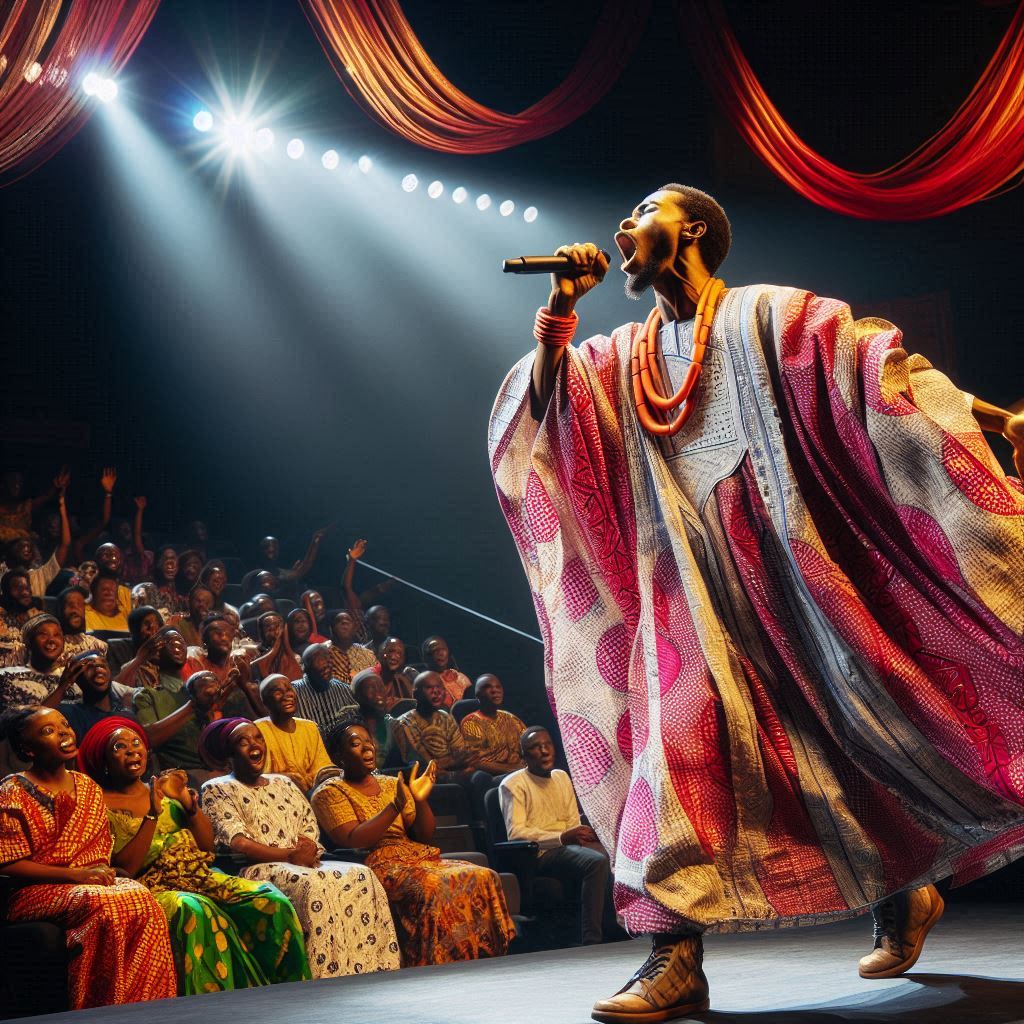Introduction
Television drama in Nigeria began in the 1960s, marking a new era in African entertainment.
Pioneers like Herbert Ogunde and Ola Balogun shaped early productions.
Nigerian Television Authority (NTA) launched in 1977, further boosting TV drama.
By the 1980s, shows like “Village Headmaster” and “Cockcrow at Dawn” became household names.
These dramas reflected societal issues and entertained millions.
Television drama holds immense importance in Nigerian culture.
It portrays the diverse Nigerian way of life and addresses social issues.
These dramas educate viewers, promote cultural values, and foster national unity.
The entertainment industry thrives due to popular TV dramas, creating jobs and boosting the economy.
Shows like “Tinsel” and “Super Story” continue to captivate audiences today.
They highlight contemporary issues and entertain with compelling storytelling.
Nigerian television drama has evolved significantly, becoming a vital cultural and economic force.
It shapes perceptions and unites the nation.
Pre-independence era
During the pre-independence era in Nigeria, the influence of colonialism played a significant role in shaping early television drama.
The colonial powers, namely the British, influenced the content and production of television programs in the country.
This influence can be seen in the themes, storytelling techniques, and even the language used in these early television dramas.
One of the key milestones in the evolution of Nigerian television drama was the introduction of televised plays and dramas in the 1950s.
This marked the beginning of a new era in Nigerian entertainment, as it brought storytelling to a wider audience through the medium of television.
The introduction of this new form of entertainment paved the way for the growth and development of Nigerian television drama.
Growth of Nigerian television drama post-independence
- Emergence of indigenous themes and stories.
- Rise of local production houses in television drama.
Following Nigeria’s independence in 1960, there was a significant shift in the landscape of television drama in the country.
With newfound freedom and independence, Nigerian storytellers and producers began to explore indigenous themes and stories in their television dramas.
This led to a renaissance in Nigerian television drama, as audiences were introduced to a diverse range of stories that reflected the culture, traditions, and values of the Nigerian people.
The post-independence era also saw the rise of local production houses specializing in television drama.
These production houses played a crucial role in the growth and development of Nigerian television drama by producing high-quality content that resonated with audiences.
They provided a platform for talented actors, writers, directors, and producers to showcase their skills and contribute to the evolution of Nigerian television drama.
Modern era of Nigerian television drama
- Impact of technology on television production.
- Exploration of contemporary social issues in television dramas.
In recent years, the evolution of Nigerian television drama has been further propelled by advancements in technology.
The introduction of digital cameras, editing software, and special effects has transformed the production quality of television dramas in Nigeria.
This has enabled producers to create visually stunning and engaging content that rivals international standards.
Moreover, modern Nigerian television dramas have not shied away from exploring contemporary social issues.
Shows now tackle topics such as corruption, gender equality, politics, and societal norms, providing a platform for critical discussions and raising awareness about important issues in Nigerian society.
This shift towards more socially conscious storytelling has resonated with audiences and further cemented the importance of Nigerian television drama in shaping public discourse.
In short, the evolution of Nigerian television drama from the pre-independence era to the modern era has been marked by significant milestones and developments.
From the colonial influences of the early years to the emergence of indigenous storytelling post-independence, and the current era of technologically advanced and socially conscious television dramas, Nigerian television drama continues to play a vital role in entertaining, educating, and influencing audiences across the country.
With a rich history and a promising future, Nigerian television drama remains a powerful medium for storytelling and cultural expression in the country.
Read: The Role of Psychology in Nigerian Corporate Sector
Growth of Nigerian television drama in the 1960s
Establishment of the Nigerian Television Authority (NTA) and Other TV Stations
The growth of Nigerian television drama in the 1960s marked a significant cultural shift.
The Nigerian Television Authority (NTA) established in 1977, played a crucial role.
Before NTA, Western Nigeria Television (WNTV) started in 1959 as Africa’s first TV station.
The advent of these stations brought television into Nigerian homes, changing entertainment forever.
The establishment of more TV stations facilitated the growth of Nigerian television drama.
Stations like Eastern Nigeria Television (ENTV) and Radio Kaduna Television (RKTV) emerged.
These stations provided platforms for local content, encouraging creativity and cultural expression.
The proliferation of TV stations led to increased production of diverse television dramas.
Pioneering Television Dramas Such as “The Village Headmaster” and “Checkmate”
Early television dramas captured the nation’s imagination.
One pioneering drama was “The Village Headmaster,” which debuted in 1968.
This show depicted life in a fictional Yoruba village and became an instant hit.
“The Village Headmaster” tackled social issues, using humor and relatable characters.
The show’s success proved the power of television to entertain and educate.
Another groundbreaking drama was “Checkmate,” which aired in the 1990s.
Although not from the 1960s, “Checkmate” played a vital role in Nigerian television history.
Created by Amaka Igwe, it highlighted urban life and societal challenges.
“Checkmate” showcased talented actors and gripping storylines, earning a massive following.
Nigerian television dramas reflected the country’s rich cultural heritage.
They showcased traditional values, customs, and languages, promoting national identity.
These dramas often addressed pressing social issues, fostering awareness and dialogue.
By doing so, they contributed to social change and national development.
The involvement of talented writers, directors, and actors propelled Nigerian television dramas forward.
Notable figures like Hubert Ogunde and Ola Balogun set high standards for storytelling.
Their contributions ensured the quality and popularity of early television dramas.
The collaboration between creatives and TV stations created a vibrant entertainment industry.
The impact of television dramas extended beyond entertainment.
They served as educational tools, informing viewers about health, politics, and culture.
Government agencies and NGOs used dramas to disseminate important messages.
This dual role of entertainment and education made television dramas indispensable in Nigerian society.
In the 1960s and beyond, Nigerian television drama evolved rapidly.
The foundation laid by pioneers paved the way for future successes.
The genre expanded to include various themes, styles, and formats.
Today, Nigerian television dramas continue to thrive, building on the legacy of their predecessors.
Read: How to Start a Private Psychology Practice in Nigeria
Challenges faced in the 1970s and 1980s
In the 1970s and 1980s, Nigerian television drama faced a myriad of challenges that hindered its growth and development.
These challenges ranged from external political factors to internal financial limitations.
Impact of political instability on television production
Political instability in Nigeria during this period had a significant impact on the production of television dramas.
The frequent changes in government and civil unrest often disrupted filming schedules and affected the quality of productions.
Television producers struggled to secure filming locations and permits due to the unpredictable nature of the political climate.
This instability also led to censorship issues, with government officials imposing restrictions on content deemed politically sensitive or controversial.
Furthermore, the lack of consistent government support for the arts meant that television producers had to navigate a complex web of bureaucratic hurdles to secure funding for their projects.
This often resulted in delayed productions and compromised artistic freedom.
Limited resources and funding for television dramas
Another major challenge faced by Nigerian television drama in the 1970s and 1980s was the limited availability of resources and funding.
The high production costs associated with filming quality dramas meant that many producers struggled to finance their projects.
Television studios were often ill-equipped with outdated technology and limited facilities, making it difficult to produce high-quality content.
This lack of resources hindered the creative vision of producers and resulted in subpar productions that failed to attract audiences.
Moreover, the commercial viability of television dramas was questionable, as advertisers preferred to invest in programs with higher ratings and viewership.
This further limited the financial resources available to producers, making it challenging to sustain long-term television drama projects.
All in all , the challenges faced by Nigerian television drama in the 1970s and 1980s were significant and multifaceted.
Political instability and limited resources posed major obstacles to the growth and development of the industry, hindering the production of quality content and stifling creativity.
Despite these challenges, Nigerian television drama persevered and continued to evolve, setting the stage for future generations of filmmakers and storytellers.
Read: Bridging the Gap in Nigerian Mental Health Services

Revival of Nigerian television drama in the 1990s
The 1990s witnessed a revival of Nigerian television drama, marked by significant changes and advancements. This period saw a resurgence of creativity and innovation, transforming the industry.
Emergence of Private Television Stations and Production Companies
The emergence of private television stations played a crucial role. African Independent Television (AIT) launched in 1996, breaking NTA’s monopoly. This shift allowed for greater competition and innovation in the industry.
Private production companies also began to flourish during this period.
Companies like Amaka Igwe Studios and Zeb Ejiro Productions emerged as key players. These companies invested in high-quality productions and talented professionals. They pushed the boundaries of storytelling and production values.
Introduction of More Diverse and Contemporary Themes in Television Dramas
The introduction of more diverse and contemporary themes revolutionized Nigerian television dramas.
Dramas began to reflect the evolving societal landscape of Nigeria.
Issues such as urbanization, politics, and family dynamics became central themes.
These new themes resonated with a broader audience, increasing viewership and engagement.
Shows like “Checkmate” and “Fuji House of Commotion” exemplified this new wave.
“Checkmate,” created by Amaka Igwe, aired in the 1990s and showcased urban life and societal challenges.
It featured complex characters and intricate storylines, setting a new standard for television dramas.
“Fuji House of Commotion” brought humor and family dynamics to the forefront, captivating audiences nationwide.
The 1990s also saw an increase in the use of indigenous languages in television dramas.
This shift promoted cultural diversity and inclusivity.
Dramas began to feature dialogues in Yoruba, Igbo, and Hausa, among other languages.
This linguistic diversity enriched the storytelling and connected with viewers on a deeper level.
Technological advancements during the 1990s further boosted the quality of television dramas.
Improved camera equipment and editing software enhanced production quality.
These technological improvements allowed for more visually appealing and professionally produced dramas.
Audiences noticed and appreciated the higher production standards.
The involvement of talented writers, directors, and actors was crucial in this revival.
Creatives like Amaka Igwe, Zeb Ejiro, and Tade Ogidan led the charge.
Their dedication to storytelling and production excellence elevated Nigerian television drama.
They mentored a new generation of creatives, ensuring the industry’s continued growth.
Read: The Future of Psychology Education in Nigeria
Golden Era of Nigerian Television Drama in the Early 2000s
The early 2000s marked the golden era of Nigerian television drama. This period saw the success of several popular TV dramas that captivated audiences nationwide.
Success of Popular TV Dramas like “Super Story” and “Fuji House of Commotion”
“Super Story,” created by Wale Adenuga Productions, became a household name.
The show premiered in 2001 and quickly gained a massive following.
“Super Story” featured relatable plots and moral lessons, resonating with viewers of all ages.
Each season presented a new story, keeping the audience engaged and eager for more.
Another standout show was “Fuji House of Commotion,” created by Amaka Igwe.
This comedy-drama depicted the chaotic life of a polygamous family.
The show’s humor and memorable characters made it an instant hit.
“Fuji House of Commotion” aired for several years, becoming a staple in Nigerian households.
These shows set a high standard for television dramas in Nigeria.
Their success demonstrated the potential of Nigerian TV dramas to entertain and educate.
They also highlighted the creativity and talent within the Nigerian entertainment industry.
Increased Viewership and Recognition of Nigerian Television Dramas on the Global Stage
The golden era saw a significant increase in viewership of Nigerian television dramas.
Audiences eagerly tuned in to watch their favorite shows, boosting ratings.
The relatable themes and engaging storylines kept viewers hooked.
This surge in viewership reflected the quality and appeal of the dramas produced during this time.
Nigerian television dramas also began to gain recognition on the global stage.
International audiences started to take notice of the unique storytelling and cultural richness.
Festivals and award shows acknowledged the excellence of Nigerian TV dramas.
This global recognition brought pride and validation to the Nigerian entertainment industry.
Technological advancements played a crucial role in this golden era.
Improved production techniques and equipment enhanced the quality of TV dramas.
These advancements allowed for more polished and professional-looking productions.
Audiences appreciated the higher production values, which contributed to the shows’ success.
The involvement of skilled writers, directors, and actors was pivotal.
Creatives like Wale Adenuga and Amaka Igwe led the charge with their innovative storytelling.
They pushed the boundaries of what Nigerian television dramas could achieve.
Their dedication and talent elevated the entire industry.
Modern trends in Nigerian television drama
Shift towards digital platforms and online streaming
In recent years, Nigerian television drama has seen a significant shift towards digital platforms and online streaming.
This trend is driven by the increasing accessibility and affordability of high-speed internet across the country.
As a result, viewers are now consuming television content on platforms like Netflix, IrokoTV, and YouTube, among others.
This shift has led to a more diverse range of content being produced, catering to the varying tastes and preferences of audiences.
Impact on content creation
The move towards digital platforms has revolutionized content creation in Nigerian television drama.
Producers are now able to explore more complex and niche storylines that may not have been viable on traditional TV channels.
This has allowed for a more diverse range of genres, themes, and narratives to be explored, appealing to a wider audience base.
Additionally, the direct feedback and data analytics provided by digital platforms enable producers to better understand viewer preferences and tailor their content accordingly.
Challenges and opportunities
While the shift towards digital platforms has opened up new opportunities for Nigerian television drama, it has also presented challenges.
One of the main challenges is the increased competition from both local and international content creators.
To stand out in the crowded digital space, Nigerian producers need to focus on creating high-quality, engaging content that resonates with audiences.
Additionally, the monetization of content on digital platforms remains a complex issue, with producers often struggling to generate revenue from their work.
Collaboration with international production companies for higher quality productions
Another modern trend in Nigerian television drama is the increasing collaboration with international production companies to produce higher quality content.
This trend has been driven by the desire to elevate the production values of Nigerian TV shows and compete on a global scale.
By partnering with international companies, Nigerian producers have access to advanced technology, expertise, and resources that can help them create world-class television dramas.
Benefits of international collaboration
Collaborating with international production companies has several benefits for the Nigerian television industry.
Firstly, it provides opportunities for skills transfer and knowledge exchange, allowing local producers to learn from seasoned professionals in the industry.
This can help improve the overall quality of Nigerian television drama and enhance the production capabilities of local talent.
Additionally, working with international partners can open up new markets and distribution networks, increasing the visibility and reach of Nigerian content globally.
Challenges and considerations
While international collaboration can bring significant benefits to the Nigerian television industry, it also comes with its own set of challenges and considerations.
Cultural differences, language barriers, and differing creative visions can sometimes pose obstacles to seamless collaboration.
It is essential for Nigerian producers to strike a balance between incorporating international expertise and maintaining the authenticity and cultural relevance of their content.
Additionally, issues related to intellectual property rights, revenue sharing, and creative control need to be carefully negotiated to ensure a fair and mutually beneficial partnership.
Discover More: Role of Nollywood in Nigerian Arts
Impact of social media on Nigerian television drama
Influence of Social Media in Promoting and Engaging Audiences
Social media has revolutionized the way Nigerian television dramas are promoted and engaged with by audiences.
With the rise of platforms like Facebook, Twitter, Instagram, and YouTube, producers and networks have found new ways to reach their target viewers.
One major impact of social media on Nigerian television drama is the ability to create buzz and generate excitement before a show airs.
Producers can release teasers, behind-the-scenes footage, and exclusive content to build anticipation among fans.
This proactive approach helps to ensure a strong viewership from the start.
Moreover, social media allows for real-time interaction between fans and the show’s creators.
Viewers can engage in discussions, share their thoughts, and provide feedback instantly.
This direct line of communication helps producers understand what their audience likes, dislikes, and wants to see more of in future episodes.
Additionally, social media enables fans to connect with each other and form online communities around their favorite shows.
This sense of belonging can lead to increased loyalty and advocacy for the drama, as fans become ambassadors who promote the show to a wider audience.
Furthermore, social media provides a platform for fans to express their creativity by creating fan art, memes, and fan fiction inspired by the television drama.
This user-generated content not only showcases the passion of the audience but also serves as free publicity for the show.
In summary, the influence of social media in promoting and engaging audiences for Nigerian television drama cannot be overstated.
It has opened up new avenues for interaction, promotion, and creativity, shaping the way producers and networks connect with their viewers.
Use of Social Media Platforms for Casting and Marketing Television Dramas
Another significant impact of social media on Nigerian television drama is its role in casting and marketing.
Producers and casting directors now leverage social media platforms to discover new talent, engage with actors, and promote auditions.
One key advantage of using social media for casting is the ability to reach a wider pool of actors beyond traditional casting agencies.
By posting casting calls on platforms like Instagram and Twitter, producers can attract talent from diverse backgrounds and regions, leading to a more inclusive and representative cast.
Moreover, social media allows for a more transparent casting process, as aspiring actors can submit their auditions online and showcase their skills through videos and photos.
This digital auditioning method is not only convenient but also cost-effective for both the actors and the production team.
Additionally, social media serves as a powerful marketing tool for television dramas, as producers can create targeted ads to reach specific demographics and promote upcoming shows.
By analyzing data on engagement and interactions, producers can fine-tune their marketing strategies for maximum impact.
Furthermore, social media influencers and celebrities play a crucial role in promoting television dramas to their followers.
By collaborating with popular personalities, producers can extend the reach of their marketing campaigns and attract new audiences who trust the recommendations of these influencers.
Overall, the use of social media platforms for casting and marketing television dramas in Nigeria has revolutionized the industry, making it more accessible, diverse, and engaging for both viewers and aspiring actors.
The power of social media continues to shape the landscape of Nigerian television drama in exciting ways.
Conclusion
Throughout the evolution of Nigerian television drama, we have seen remarkable growth and development in the industry.
From the early days of radio dramas to the modern, high-quality productions we see today, Nigerian television drama has come a long way.
It is essential to recap the different stages of this evolution, from the pioneering works of the 60s and 70s to the explosion of talent and creativity in recent years.
Nigerian television drama has played a significant role in shaping the cultural landscape of the country, reflecting societal issues and providing entertainment to millions of viewers.
As we look to the future, it is crucial to continue supporting and investing in the growth of the Nigerian television drama industry.
By nurturing young talent, providing opportunities for storytelling, and fostering creativity, we can ensure that the industry continues to thrive and produce high-quality content that resonates with audiences both at home and abroad.
By recognizing the importance of Nigerian television drama and continuing to support its growth, we can ensure that this vibrant and dynamic industry remains a cornerstone of Nigerian entertainment for many years to come.




